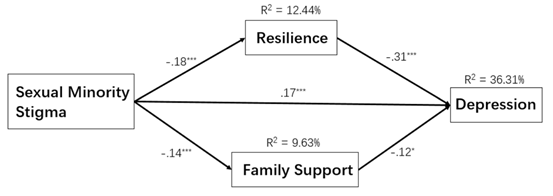Dr. Guangyu Zhou’s lab from School of Psychological and Cognitive Sciences at Peking University published the paper “The impact of sexual minority stigma on depression: The roles of resilience and family support” on Sexuality Research and Social Policy. The study examined the negative impact of sexual minority stigma and identified resilience and family support as key underlying pathways among LGBTQ individuals in China.
Prior studies consistently found that compared to heterosexual individuals, sexual minorities in China who experience sexual minority stigma have elevated risks for psychopathology. However, the underlying mechanism remains unclear. Based on the minority stress theory and psychological mediation framework, this study revealed that at the intrapersonal level, stigma may erode sexual minority individual’s resilience and consequently render them vulnerable to depression. In the meantime, in the interpersonal process, sexual minorities are more likely to be rejected and alienated by families, and be reluctant to seek support from families when facing stigma, which results in intensified depressive symptoms. Intrapersonal and interpersonal processes served distinctive but interrelated mechanisms through which sexual minority stigma conferred adverse mental health outcomes.

This study sheds light on why sexual minorities are more susceptible to mental health disorder and is therefore of special relevance to healthcare professionals and policy makers on improving mental health of Chinese sexual minorities.
The study was supported by PKU startup grant for new faculty. Miss Yixuan Wang is the first author and Dr. Guangyu Zhou is the corresponding author.
Wang, Y., Lao, C. K., Wang, Q., & Zhou, G. (2021). The impact of sexual minority stigma on depression: The roles of resilience and family support. Sexuality Research and Social Policy. https://doi.org/10.1007/s13178-021-00558-x


